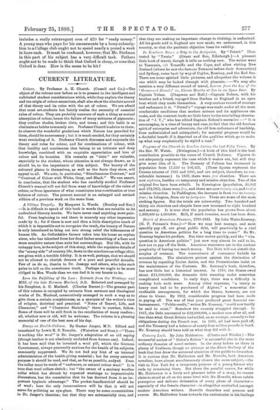Sketch of American Finances, 1789-1835. By John Watts Kearney. (G.
P. Putnam's Sons.)—" How we may best manage, and most speedily pay off, our great public debt, will practically be a vital question in American politics for a long time to come." So Mr. Kearnay begins his preface. But time moves quickly, and the "vita question in American politics" just now may almost be said to be, how not to pay off the Debt. American statesmen are in the curious perplexity of having too much money. The Debt will not absorb the surplus of revenue. The convenience of commerce forbids its accumulation. The abstainers protest against the diminution of revenue by repealing Excise duties, and the Protectionists insist on the maintenance of the Customs. Mr. Kearnay's book, therefore, has now little but a historical interest. In 1789, the States owed about £11,000,000, the domestic debt standing under somewhat complicated conditions. In early days, there was a difficulty in making both ends meet. Among other expenses, "a treaty at heavy cost had to be purchased of Algiers," a somewhat dis- creditable arrangement, for which the States, however, are not alone to blame. By 1812, considerable progress had been made in paying off. The war of that year produced great financial em- barrassment. "Public credit," writes Mr. Kearney, "could now hardly be said to exist." Somehow the country struggled through. In 1817, the Debt amounted to £22,000,000, a modest sum after all, and less than what Great Britain had added, on an average, annually to her obligations during the French war. In 1833, all bad been paid off, and the Treasury had a balance of nearly four million pounds in hand. Mr. Kearney should have told us what they did with it.






































 Previous page
Previous page